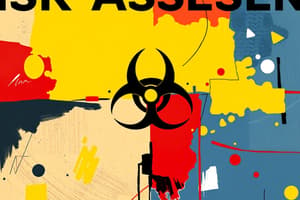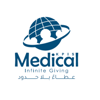Podcast
Questions and Answers
What is the total number of assessment activities mentioned?
What is the total number of assessment activities mentioned?
- 8%
- 4291 (correct)
- 15%
- 335
FMS standards are based solely on the number of patients at risk.
FMS standards are based solely on the number of patients at risk.
False (B)
How many FMS assessment activities are listed?
How many FMS assessment activities are listed?
335
The percentage load for MD is ______%
The percentage load for MD is ______%
Match the specialty with its corresponding percentage load:
Match the specialty with its corresponding percentage load:
Who are the primary stakeholders involved in safety management?
Who are the primary stakeholders involved in safety management?
Safety management is solely the responsibility of the personnel in an organization.
Safety management is solely the responsibility of the personnel in an organization.
What is the primary function of safety management?
What is the primary function of safety management?
Safety management ensures that all safety risks have been identified, assessed, and satisfactorily __________.
Safety management ensures that all safety risks have been identified, assessed, and satisfactorily __________.
Match the following components of safety management with their definitions:
Match the following components of safety management with their definitions:
What is a key component of a proactive safety management strategy?
What is a key component of a proactive safety management strategy?
A safety management strategy should only focus on responding to incidents after they occur.
A safety management strategy should only focus on responding to incidents after they occur.
What is the primary goal of proactive safety management?
What is the primary goal of proactive safety management?
A proactive safety management strategy includes _____ hazards to reduce safety risks.
A proactive safety management strategy includes _____ hazards to reduce safety risks.
Which of the following is NOT one of the eight main plans/topics included in the F M S Chapter?
Which of the following is NOT one of the eight main plans/topics included in the F M S Chapter?
Emergency Preparedness plans (External) are one of the main topics included in the F M S Chapter.
Emergency Preparedness plans (External) are one of the main topics included in the F M S Chapter.
Name one main plan/topic related to Facility Safety.
Name one main plan/topic related to Facility Safety.
The main topic related to handling toxic substances is __________.
The main topic related to handling toxic substances is __________.
Match the following sections with their descriptions:
Match the following sections with their descriptions:
What is one method to motivate staff?
What is one method to motivate staff?
All maintenance work at the hospital can be conducted by any available staff.
All maintenance work at the hospital can be conducted by any available staff.
What should maintenance works at the hospital be conducted by?
What should maintenance works at the hospital be conducted by?
Motivating staff involves both financial and __________ gestures.
Motivating staff involves both financial and __________ gestures.
Match the following terms with their descriptions:
Match the following terms with their descriptions:
Who is responsible for directing and coordinating all aspects of the facility management and safety program?
Who is responsible for directing and coordinating all aspects of the facility management and safety program?
The facility management and safety program is directed by multiple individuals.
The facility management and safety program is directed by multiple individuals.
What is the main role of the director of the facility management and safety program?
What is the main role of the director of the facility management and safety program?
The __________ directs and coordinates the facility management and safety program.
The __________ directs and coordinates the facility management and safety program.
Match the roles to their responsibilities:
Match the roles to their responsibilities:
Flashcards
Risk Assessment for Healthcare (ESR)
Risk Assessment for Healthcare (ESR)
A measure of healthcare risk based on the chance of harm, how serious that harm could be, and the number of people at risk.
Importance of Maintenance Records
Importance of Maintenance Records
Maintenance and repair records are important for keeping track of equipment problems and ensuring safety.
FMS as High-Risk Standard
FMS as High-Risk Standard
The FMS standard is considered a high-risk factor by NHS standards. This means it has a significant impact on patient safety.
FMS Assessment Activities
FMS Assessment Activities
Signup and view all the flashcards
Specialty-Specific FMS Assessment
Specialty-Specific FMS Assessment
Signup and view all the flashcards
Occupants
Occupants
Signup and view all the flashcards
Safety Management
Safety Management
Signup and view all the flashcards
Safety Risks
Safety Risks
Signup and view all the flashcards
Risk Mitigation
Risk Mitigation
Signup and view all the flashcards
Organizational Responsibility
Organizational Responsibility
Signup and view all the flashcards
Proactive Safety Management
Proactive Safety Management
Signup and view all the flashcards
Hazards
Hazards
Signup and view all the flashcards
Risk Reduction Actions
Risk Reduction Actions
Signup and view all the flashcards
Proactive vs. Reactive
Proactive vs. Reactive
Signup and view all the flashcards
Facility Safety
Facility Safety
Signup and view all the flashcards
Security
Security
Signup and view all the flashcards
Life/Fire Safety
Life/Fire Safety
Signup and view all the flashcards
Internal Emergency Preparedness Plans
Internal Emergency Preparedness Plans
Signup and view all the flashcards
External Emergency Preparedness Plans
External Emergency Preparedness Plans
Signup and view all the flashcards
Facility Management and Safety Program Director
Facility Management and Safety Program Director
Signup and view all the flashcards
Facility Management and Safety Program
Facility Management and Safety Program
Signup and view all the flashcards
Coordinating Facility Management and Safety
Coordinating Facility Management and Safety
Signup and view all the flashcards
Directing Facility Management and Safety
Directing Facility Management and Safety
Signup and view all the flashcards
Importance of the Program Director
Importance of the Program Director
Signup and view all the flashcards
Qualified Maintenance Staff
Qualified Maintenance Staff
Signup and view all the flashcards
Staff Motivation
Staff Motivation
Signup and view all the flashcards
Financial & Emotional Motivation
Financial & Emotional Motivation
Signup and view all the flashcards
Study Notes
King Salman Hospital - Facility Management & Safety (FMS) Overview
- Total number of FMS Standards: 39
- Total number of Sub-Standards assessed by FMS Surveyor: 350 (15% of total)
- Sub-Standards assessed by FMS Surveyor in the FMS Domain: 171
- Sub-Standards FMS Surveyor Sharing with others: 143
- Sub-Standards assessed by FMS Surveyor outside the FMS Domain: 36
Example of a Standard Scored by FMS Surveyor
- FM.21: The hospital has an effective fire alarm system.
- FMS.21.1: A fire alarm system that is functional and regularly inspected as per civil defense guidelines.
- FMS.21.2: Fire alarm system testing results are documented.
- FMS.21.3: The fire alarm system has preventive maintenance.
- FMS.21.4: Elevators are connected to the fire alarm system.
Example of a Standard Scored by More Than One Surveyor
- LD.26: The department head develops an organizational chart for the department.
- LD.26.1: Each department has an organizational chart that clearly displays all sections/divisions, titles (or names), lines of authority, accountability, and reporting relationships.
- LD.26.2: The organizational chart is signed by the department head and approved by the hospital management.
- LD.26.3: The organizational chart is communicated to the staff working in the department.
Example of a Standard Assessed by FMS Surveyor Outside His/Her Domain
- RS.3: All equipment and machines in the respiratory care services are operated within manufacturers' specifications and maintained free of defects.
- RS.3.1: All equipment and machines are operated within manufacturers' specifications.
- RS.3.2: The periodical preventive maintenance is developed and implemented in accordance with manufacturers' instructions.
- RS.3.3: All maintenance and repair records are maintained for future reference and inspection.
NHS 3rd Edition - ESR Standards
- FMS.9: The hospital ensures all occupants are safe from radiation hazards.
- FMS.32: The hospital ensures proper maintenance of the medical gas system.
- FMS.21: The hospital has an effective fire alarm system.
- FMS.22: The hospital has a fire suppression system in the required areas.
- FMS.23: There are fire exits that are properly located in the hospital.
- FMS.24: The hospital and its occupants are safe from fire and smoke.
NHS 3rd Edition - Assessment Activities
- Total number of assessment activities: 4291
- FMS Assessment Activities: 335
Surveyor Load/Specialty
- FMS: 8%
- LD: 14%
- LB: 17%
- PH: 12%
- IC: 15%
- NR: 15%
- MD: 19%
FMS Assessment Activities
- Document Review
- Medical Record Review (N/A)
- Personnel Files Review
- Observation
- Leadership Interview
- Unit Visit Interview
- Unit Visit Documented Evidence
Weight of Each Assessment Category
- Interview: 8%
- Unit Visit Interview: 12%
- Documented Evidence: 16%
- Document Review: 27%
- Personnel File Review: 9%
- Medical Record Review: 0%
- Observation: 37%
Types of Documents
- Policy & Procedures
- Plans
- Meeting Minutes
- Programs
- Charts (Organization, Improvement)
- Records
- Reports
- Forms
- Guidelines
- Licenses & Certifications
Compliance Checklist
- Approval
- Content
- Serve the purpose
- Validity
- Applicability
- Accessibility
- Implementation
- Format
- Multidisciplinary
Multidisciplinary - New Medical Equipment Policy & Procedures
- Definition: New
- Owner: Biomedical Engineering
- Applicability: Physicians, Nursing, Security
Policy & Procedures
- Legal Document
- Not Time Related
- Coverage
- Awareness
- Master Policy
FMS Standards Overview
- FMS.1 - FMS.10 - Facility Safety
- FMS.11 - FMS.13 - Security
- FMS.14 - FMS.15 - Hazardous Materials
- FMS.16 - FMS.17 - Emergency Preparedness and Plans
- FMS.18 - FMS.24 - Fire Safety
- FMS.25 - FMS.27 - Medical Equipment
- FMS.28 - FMS.39 - Utility Systems
How to Implement Safety
- Hospital leadership provides support & resources aligned with regulatory requirements.
- Hospital has plans to manage safety of the environment.
- Staff is educated on their responsibilities (commencing at orientation, continuing regularly).
- Hospital collects & analyzes data to determine plan effectiveness and facilitate quality improvement.
Who is Responsible for Safety?
- All Staff is responsible for ensuring their own safety.
- All Staff is responsible for reporting any safety violations.
When to Implement Safety
- Safety comes first
- Implement safety on a daily basis
Main Eight (8) Plans/Topics in the FMS Chapter
- Facility Safety
- Security
- Life/Fire Safety
- Emergency Preparedness (Internal)
- Emergency Preparedness (External)
- Hazardous Materials & Waste Disposal
- Medical Equipment
- Utilities
FMS and Leadership
- Hospital leaders establish and support a Facility Management and Safety program.
- Hospital leaders support the program to acquire the essential equipment.
- The program has a budget for necessary upgrades or replacements.
- Orientation program for all new hires.
Staff Motivation
- Motivating staff with financial or emotional gestures.
- Important for hospital leaders to appreciate hard-working staff to ensure compliance with safety policies and procedures.
Effective Communication
- Effective communication creates a healthy environment for safety.
- Facilitates identifying, reporting, and mitigating safety issues.
Utilizing Technology for Communication
- Technology improves communication during emergencies.
- Example systems: BMS, Overhead Paging, PA system, Security/Safety Walkie-Talkie, 2-way radio.
Infrastructure
- Infrastructure refers to the fundamental facilities, utilities, and systems.
- Example items: Power distribution systems, water distribution system, hospital buildings, medical equipment, pavements and roads.
Infrastructure (Additional details)
- Saudi Building Code is crucial for complying with safety requirements.
- Safety needs to be integrated into engineering drawings.
- Leaders need to ensure safety standards are met, especially in older buildings.
Organizational Culture
- Leaders are role models for their employees, infecting them with a safety-first culture (Safety is Everyone's Responsibility).
- How to achieve this:
- Conduct Leadership safety rounds
- Encourage staff to report hazards and risks
- Chair safety committees
- Empower safety departments
- Authorize intervention in unsafe practices.
Continuous Training
- Training for teaching/developing skills and knowledge.
- Related to specific competencies.
- Improve capability, capacity, productivity, and performance
- Examples: Emergency codes, hazardous materials handling, evacuation procedures, equipment operation, violent behavior, child kidnap/bomb threats.
Studying That Suits You
Use AI to generate personalized quizzes and flashcards to suit your learning preferences.





